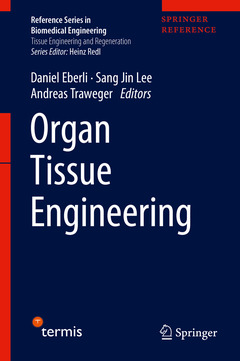Organ Tissue Engineering, 1st ed. 2021 Tissue Engineering and Regeneration Series
Coordonnateurs : Eberli Daniel, Lee Sang Jin, Traweger Andreas

The notion of being able to engineer complete organs has inspired an entire generation of researchers. While recent years have brought significant progress in regenerative medicine and tissue engineering, the immense challenges encountered when trying to engineer an entire organ have to be acknowledged. Despite a good understanding of cell phenotypes, cellular niches and cell-to-biomaterial interactions, the formation of tissues composed of multiple cells remains highly challenging. Only a step-by-step approach will allow the future production of a living tissue construct ready for implantation and to augment organ function.
In this book, expert authors present the current state of this approach. It offers a concise overview and serves as a great starting point for anyone interested in the application of tissue engineering or regenerative medicine for organ engineering. Each chapter contains a short overview including physiological and pathological changes as well as the current clinical need. The potential cell sources and suitable biomaterials for each organ type are discussed and possibilities to produce organ-like structures are illustrated. The ultimate goal is for the generated small tissues to unfold their full potential in vivo and to serve as a native tissue equivalent. By integrating and evolving, these implants will form functional tissue in-vivo. This book discusses the desired outcome by focusing on well-defined functional readouts. Each chapter addresses the status of clinical translations and closes with the discussion of current bottlenecks and an outlook for the coming years.
A successful regenerative medicine approach could solve organ shortage by providing biological substitutes for clinical use - clearly, this merits a collaborative effort.
Sang Jin Lee, Ph.D., is currently a tenured associate professor at Wake Forest Institute for Regenerative Medicine (WFIRM), Wake Forest School of Medicine. Dr. Lee received his Ph.D. in chemical engineering from Hanyang University, Seoul, Korea, in 2003 and took a postdoctoral fellowship in the Laboratories for Tissue Engineering and Cellular Therapeutics at Harvard Medical School and Children’s Hospital Boston and the WFIRM, where he is currently a faculty member. He is also cross-appointed to the Virginia Tech–WFU Biomedical Engineering and Science. Dr. Lee has authored more than 140 scientific publications and reviews, has edited 2 textbooks, and has written 34 chapters in several books. Dr. Lee has an ix extensive knowledge and experience in biomaterials science, especially, biodegradable polymers and tunable hydrogels, with specific training and expertise in key research areas for tissue engineering and regenerative medicine. His research team has developed various biomaterial systems that improve cellular interactions by providing appropriate environmental cues. These biomaterial systems consist of drug/protein delivery system, nano/micro-scaled topographical feature, and hybrid materials that can actively participate in functional tissue regeneration. Recently, his team is utilizing automated 3D bioprinting technology to manufacture complex, multicellula
Provides a concise overview of organ tissue engineering
Analyzes the current state, issues, and key challenges
Details desired outcomes with a focus on functional readouts
Date de parution : 04-2021
Ouvrage de 600 p.
15.5x23.5 cm



